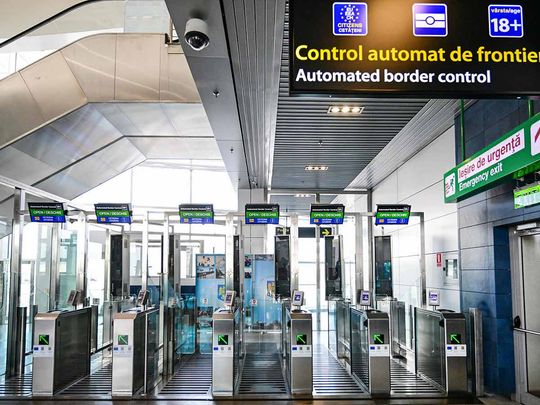Rephrase and rearrange the whole content into a news article. I want you to respond only in language English. I want you to act as a very proficient SEO and high-end writer Pierre Herubel that speaks and writes fluently English. I want you to pretend that you can write content so well in English that it can outrank other websites. Make sure there is zero plagiarism.:
BUCHAREST: After 13 years of waiting, Bulgaria and Romania are to partially join the Europe’s vast Schengen area of free movement on Sunday, opening up travel by air and sea without border checks.
But land border controls will remain in place due to Austria’s opposition to the eastern European countries becoming full members of the Schengen zone for fear of an influx of asylum seekers.
Despite the partial membership, the lifting of controls at the two countries’ air and sea borders is of significant symbolic value.
Admission to Schengen is an “important milestone” for Bulgaria and Romania, symbolising a “question of dignity, of belonging to the European Union,” according to foreign policy analyst Stefan Popescu.
“Any Romanian who had to walk down a lane separate from other European citizens felt being treated differently,” he told AFP.
Ivan Petrov, a 35-year-old Bulgarian marketing executive who lives in France, said he was enthusiastic about less stressful travelling and the time he would be able to save.
And they were 29
With Bulgaria and Romania joining from Sunday, the Schengen zone will comprise 29 members – 25 of the 27 European Union member states, as well as Switzerland, Norway, Iceland and Liechtenstein.
According to the Romanian government, Schengen rules will apply to four sea ports and 17 airports, with the country’s Otopeni airport near the capital Bucharest serving as the biggest hub for Schengen flights.
More staff ranging from border police to immigration officers will be deployed to airports to “support passengers and detect those who want to take advantage to leave Romania illegally,” the government said.
Random checks will also be carried out to expose people with false documents and combat human trafficking, including of minors.
Bulgaria and Romania both hope to fully integrate into Schengen by the end of the year, but Austria has so far only relented about allowing them to join by air and sea.
Croatia, which joined the EU after Romania and Bulgaria, beat them in January 2023 by becoming Schengen’s 27th member.
Created in 1985, more than 400 million people can travel freely inside the Schengen area without internal border controls.
‘Irreversible process’
While some have reason to celebrate, truck drivers, faced with endless queues at the borders with their European neighbours, feel left out.
Earlier this month, one of Romania’s main road transporter unions called for “urgent measures” to achieve full Schengen integration as soon as possible, deploring huge financial losses caused by the long waits.
“Romanian hauliers have lost billions of euros every year, just because of long waiting times at borders,” secretary general Radu Dinescu said.
According to the union, truckers usually wait eight to 16 hours at the border with Hungary, and from 20 to 30 hours at the Bulgarian border, with peaks of three days.
Bulgarian businesses have also voiced their anger over the slow progress.
“Only three percent of Bulgarian goods are transported by air and sea, the remaining 97 percent by land,” said Vasil Velev, president of the Bulgarian Industrial Capital Association (BICA).
“So we’re at three per cent in Schengen and we don’t know when we’ll be there with the other 97 percent,” he told AFP.
Bucharest and Sofia have both said that there will be no going back.
“There is no doubt that this process is irreversible,” Romanian Interior Minister Catalin Predoiu said this month, adding it “must be completed by 2024 with the extension to land borders”.

